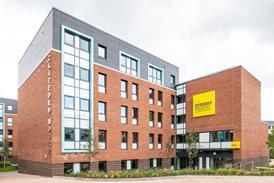The tide is beginning to turn across the property industry when it comes to diversity and inclusion (D&I), yet one area that is often overlooked is meeting the needs of a neurodiverse workforce.

It is estimated that 15% of the UK’s population have a neurodivergent condition, including autism spectrum conditions, ADHD, dyspraxia and dyslexia – although the percentage is thought to be higher, as many people will be undiagnosed.
In 2013, tech giant SAP launched an Autism at Work programme to actively widen its pool of applicants and reported productivity gains, quality improvements and a boost in innovative capabilities. The listed German company says the initiative included someone who helped develop a technical fix worth an estimated $40m (£33m) in savings.
Neurodivergent individuals think and process differently, with strengths such as creativity, problem-solving, visualisation skills and innovative thinking. But at the same time, work-related tasks such as punctuality, taking accurate notes or time management can be a challenge. Managing conflict and confrontation can be areas of concern, and even social events may need extra thought.
Greater awareness
As employers and colleagues, it is our duty to be more informed and to offer better support where needed. Ultimately, businesses need sufficient awareness to understand the range and depth that the term ‘neurodiversity’ covers.
In-house D&I teams are the first port of call and greater awareness can be provided through training by a third-party expert. Daniel Brooke, founder of Neurodiversity Specialists, says greater employer awareness can break down communication barriers and improve productivity, wellbeing and staff satisfaction.
Team members can also use this knowledge to engage more productively and effectively with clients and customers, delivering work in a way that is more accessible to more people.

A holistic approach should be considered when seeking to improve neurodiversity support and awareness by considering the employee lifecycle.
From the initial interview process to retaining talent and tapping into unique skillsets, employers should consider how their current approaches might be disadvantaging neurodiverse candidates and employees.
Many will have missed out on brilliant candidates because they were not offered the opportunity to showcase their strengths. Key employment areas in which to offer further support include the recruitment process, performance reviews, HR policies and gender inequality.
Above all, individuality is essential: many conditions are a spectrum, traits can overlap and the same diagnosis may manifest differently in different people. It can also be a very sensitive area, with approaches to management down to personal choice. Having set up inclusive ways of working and managing, take your lead from your team member.
Finally, several organisations have been established to offer insight and support – from training and funding through to professional LinkedIn groups such as Neurodiversity in Planning.
Once attention is focused on this area, there are many ways to make meaningful improvements quickly.
Bethany Bennett is a surveyor at property consultancy Montagu Evans






























No comments yet